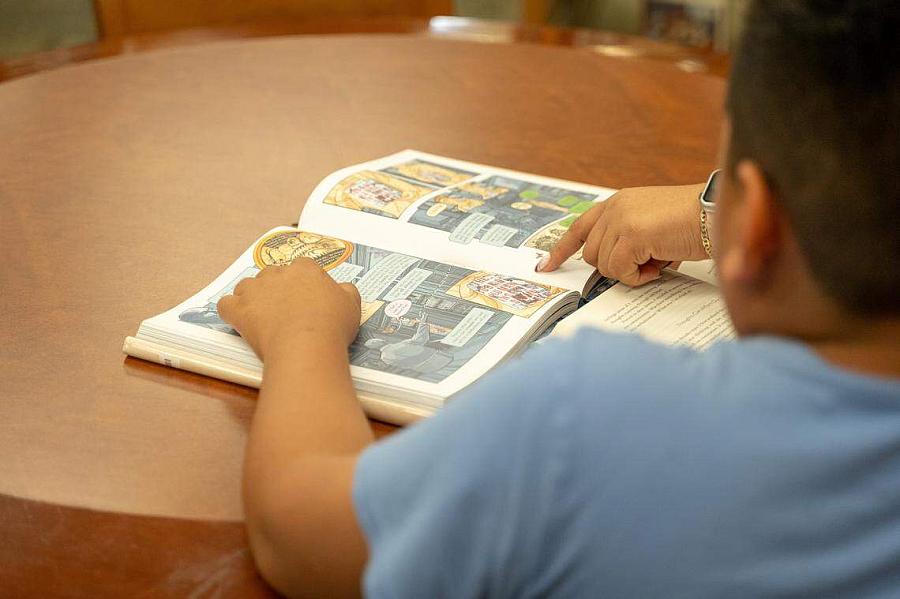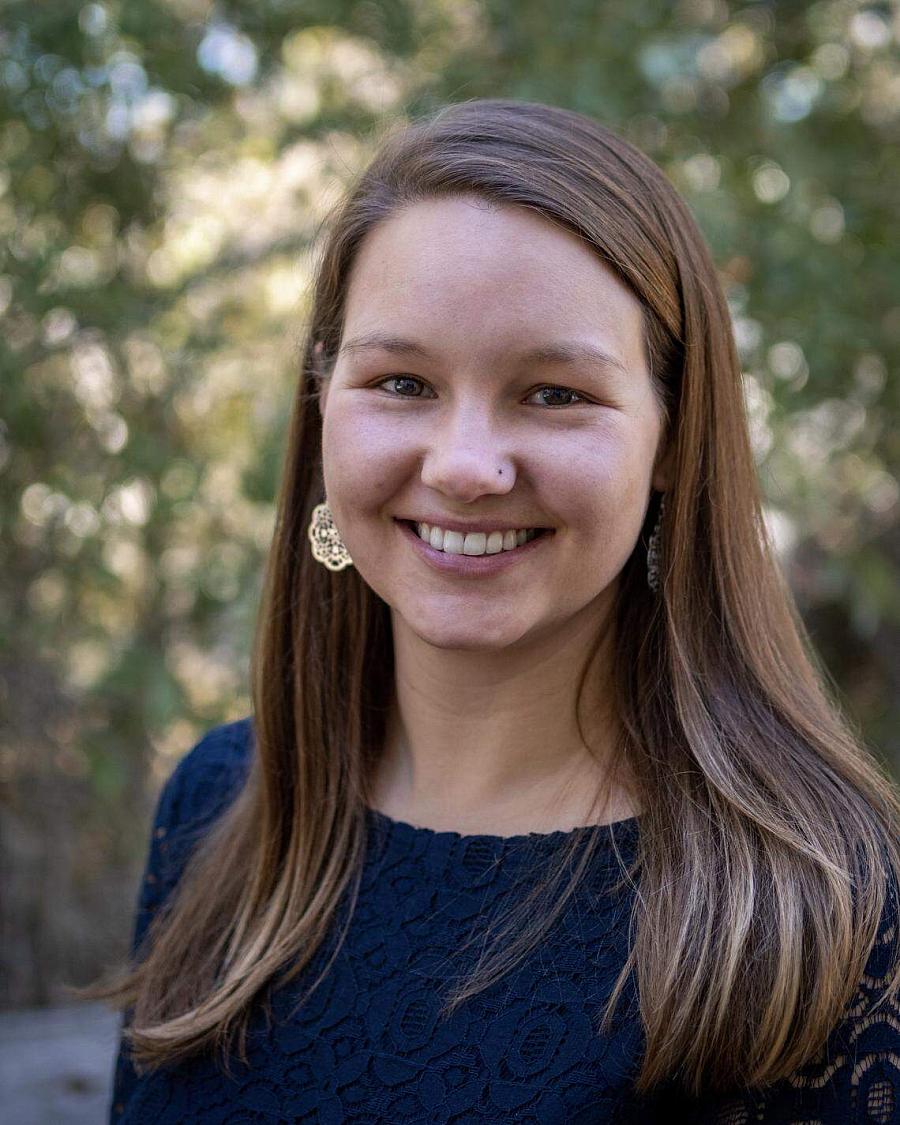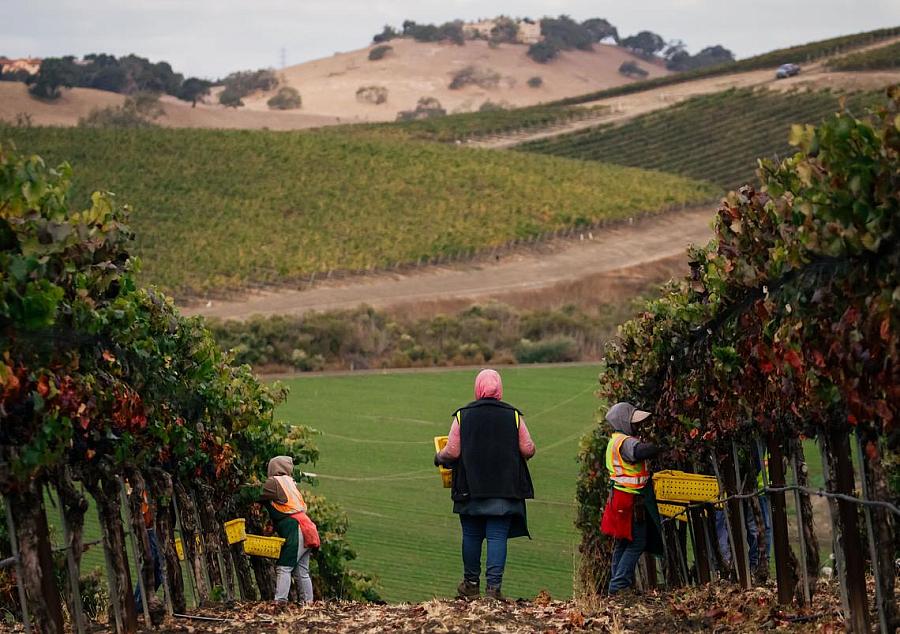An invisible threat: How pesticides endanger expectant mothers and their babies
The story was originally published by The Tribune with support from our 2025 California Health Equity Fellowship.

Rosa worked in a vineyard while pregnant with her son 14 years ago. He was diagnosed with autism at 6 months old, and she blames the pesticide exposure.
Joan Lynch jlynch@thetribunenews.com
The sunrise stained the sky pink as a mother and her coworker drove to their vineyard jobs on a warm July morning about 14 years ago.
They discussed their families and the vineyard, while their conversation overlapped with music or static depending on the reliability of the radio signal.
At four months pregnant, Rosa would have preferred to be at home resting, but that wasn’t an option if she wanted to keep food on the table for herself and her two young sons. So, she drove to the worksite in the Santa Barbara County town of Los Alamos as she always did.
She spoke on the condition of anonymity to protect herself from retaliation, so The Tribune will refer to her by her grandmother’s name, Rosa.
Rosa arrived at the worksite at about 6 a.m. to find a pungent, chemical odor curling around the grapevines. It didn’t take long for the fumes to give her a headache.
At night, the vines were sprayed with pesticides. By morning, when Rosa started working, she would often experience some kind of allergic reaction to the leftover chemicals — normally hives or difficulty breathing. Her coworkers commiserated about nosebleeds and dizzy spells, she said.
But on that one morning in 2011, her usual allergic reaction turned dangerous.
After pruning grapevines for about 15 minutes, she felt like she had a cold, with a runny nose and sore throat. Soon, her hands burned as if she had touched a hot stove. The feeling slowly spread throughout her body, so she left the worksite.
When she got home, she took a bath. That’s when she noticed the rash covering her skin.
“It felt like all of my skin was burning. It filled my limbs, like, my whole body with little welts,” she told The Tribune in Spanish through an interpreter.
So she drove to the hospital, where a nurse gave her an EpiPen and another medication through an IV. They told her she likely had an allergic reaction to her soap in the shower. But she knew better. She blamed the pesticides.
When she reported the incident to her supervisor, he said, “I didn’t smell anything.” If the pesticides were so bad, other people would have gotten sick too, he said. Besides, she left the worksite — so there was no way to prove the allergic reaction started in the field, he said.
“They were trying to cover it up,” she said.
Infant son diagnosed with autism
Rosa returned to the fields just a few days after her allergic reaction, and she continued to work until November 2011 — one month before her son was born.
Within six months of this birth, the boy Rosa carried while working in the vineyard began exhibiting developmental differences.
For example, Rosa’s older sons started communicating with her as infants with coos and cries, but her youngest son was a very quiet baby, she said. Even at that young age, he was diagnosed with autism.
Like her rashes and headaches, she blames pesticide exposure for the development of her son’s autism.
Autism isn’t a flaw in her son’s personality, she said. It simply means that he processes the world differently. Rosa embraces her son and his autistic traits, but she worries that he could face discrimination his whole life because of his differences.
She has since dedicated her life to offering farmworker parents the support she always needed.
Until September, Rosa worked for the nonprofit Central Coast United for a Sustainable Economy, which partnered with UC Law San Francisco’s Center for WorkLife Law to start Dar A Luz, a program that helps farmworkers enroll in State Disability Insurance benefits while pregnant.
Today, she urges farmworkers to stop working with pesticides when they get pregnant, even though she knows that is a difficult proposition for immigrant families who depend on these jobs.
Exposure to pesticides “is going to be a problem with lifelong consequences. In school, in society, even within the family,” she said.
Raising an autistic child in an immigrant household
Growing up, Rosa’s son didn’t enjoy watching cartoons, playing with toy cars or socializing with other children like his brothers did. Instead, he preferred to play with puzzles or organize water bottle caps by color and size.
In elementary school, he often asked profound questions, like, “Where does sand come from?” “What made the dinosaurs go extinct?” or “How many times has the Starbucks logo changed?” Then he would research the answer and tell his mother everything he learned.
While Rosa saw the beauty in her son’s mind, other families in their neighborhood told their children not to play with him. She heard other parents call him “malito,” which means, “little bad kid” in Spanish. Not only did they see him as different, but they thought there was something wrong with his disposition.
Now, as a 13-year-old, her son excels academically and does the homework of a junior in high school, but he’s bullied by his classmates.
Last year, a group of students would spit on her son’s backpack every day as he walked to school. Rosa reported the incident to the school, but the administration said it couldn’t do anything about the bullying if it happened off school property. Now, Rosa walks her son onto campus to protect him from the bullies.

Rosa worked in a vineyard while pregnant with her son 14 years ago. He was diagnosed with autism at 6 months old, and she blames the pesticide exposure.
Joan Lynch jlynch@thetribunenews.com
The bullying only intensified during the school year. In April, a group of eighth-grade boys hit her son and bruised him. Rosa again reported the incident to the school. The administration said they would investigate it, but she still hasn’t received any updates.
Rosa loves her son for exactly who he is, including his autistic traits, but she said it’s painful to watch other people reject him.
She said Latino culture isn’t very accepting of autism.
When she’s spoken to other parents of autistic children who may need extra support, she hears those parents say, “No, my child would never need that. My child is normal.”
Rosa encouraged other parents of autistic children to embrace their differences.
“That’s the most important thing in the world,” she said in Spanish.
Could autism be linked to pesticide exposure?
Rosa started volunteering with Central Coast Alliance United for a Sustainable Economy in August 2024, and she was hired as an employee in July 2025.
At the time, the nonprofit launched a campaign to expose the dangers of pesticides. She realized then that her son’s autism could be related to prenatal pesticide exposure.
Her two oldest sons were born in Florida while she worked in a laundromat. Neither of them were exposed to pesticides, and they did not experience any developmental disabilities, she said.
Meanwhile, she has met multiple farmworker families who had autistic children, too.
So far, researchers have drawn correlations between numerous genetic and environmental factors and the development of autism, but no researcher has identified a proven cause.
According to a 2014 study, children had a 60% increased risk of developing autism if their mother lived near agricultural pesticide application while pregnant.
A 2018 study, however, “did not find clear evidence of associations” between living near pesticides while pregnant and the child’s development of autism.
Overall, studies have shown a “potential association” between prenatal pesticide exposure and an increased risk of developing autism, especially if the mother made contact with organophosphate pesticides during pregnancy, according to a 2021 review of research conducted on the topic from 1977 to 2020.
The study concluded that pesticide exposure should be considered one of the “emerging risk factors” for autism, but the study also called for further research on the association between pesticides and autism.

UC Berkeley professor Dr. Carly Hyland studies the impact of insecticides on the health of people living and working near agricultural fields.
Courtesy of Dr. Carly Hyland
UC Berkeley professor Dr. Carly Hyland studies the impact of insecticides on the health of people living and working near agricultural fields.
She has conducted research on organophosphate insecticides, which disrupt the insect’s brain and nervous system. The pesticide can attack the human brain and nervous system, too, she said.
“We’ve seen pretty consistent evidence that these (organophosphate) insecticides are really harmful for children’s brains, and those effects are greatest when the exposure is occurring during pregnancy,” she told The Tribune.
Prenatal pesticide exposure is also linked to miscarriages, preterm births and low birth weight, according to the Center for WorkLife Law.

Rosa worked in a vineyard while pregnant with her son 14 years ago. He was diagnosed with autism at 6 months old, and she blames the pesticide exposure.
Joan Lynch jlynch@thetribunenews.com
Pregnant farmworkers can apply for State Disability Insurance
California’s State Disability Insurance program, which is managed by the Employment Development Department, offers short-term paid leave to eligible workers who need time off from work due to illness, injury, pregnancy, surgery and other related conditions.
People who work in California make contributions to State Disability Insurance through payroll deductions, similar to taxes, according to Center for WorkLife Law attorney Juliana Franco.
The program provides people with up to 90% of their wages for a maximum of 52 weeks, she said.
Pregnant farmworkers are eligible for State Disability Insurance from the moment they know they are pregnant.
“It’s really a matter of preventing the health risks that have been so heavily documented with prenatal pesticide exposure that disproportionately impact low-wage communities of color,” Franco said.
Franco leads the Dar A Luz Program for the Center for WorkLife Law in partnership with the Central Coast Alliance United for a Sustainable Economy.
People working and paying taxes in California are eligible for State Disability Insurance regardless of their citizenship status, but it’s difficult for undocumented workers to apply for benefits because the online application system requires a Social Security number, Franco said.

Workers harvest pinot noir grapes at a vineyard in Arroyo Grande.
Joe Johnston The Tribune
That allows the Employment Development Department to find the person’s wages in the system.
Those without a Social Security number must use a paper application to apply for benefits. They can show proof of their wages with other documents, such as payroll check stubs.
“You can leave certain boxes on the application blank, and you can submit a cover letter with the claim, you know, explaining the wages you earned that will help the agency find the contributions,” Franco said.
The paper application takes longer to process, so the Center for WorkLife Law has been advocating for the EDD to remove the Social Security number requirement from the online application.
Franco said the department can’t tell if an applicant is undocumented unless they outright say so on their application. There are many reasons someone may submit a paper application, such as a recent name change or if their name is too long for the online claim form.
In a statement, the Employment Development Department told The Tribune that it will “limit the collection of personal information and protect the personal information it collects and maintains.”
“The program is available regardless of immigration status, and I want to say that it is safe to apply,” Franco said. “But I honestly don’t know what this administration is going to do.”

Workers harvest pinot noir grapes at a vineyard in Arroyo Grande.
Joe Johnston The Tribune
How SDI protected a mother’s health
Rosa now helps educate pregnant women about the dangers of pesticides, while providing advice and resources on state disability benefits.
One mother she assisted was working in a tangerine orchard when she discovered that she was pregnant with her third child.
The woman had moved to Santa Barbara County from Guerrero, Mexico, in 2023 with her two children, who are now 5 and 6 years old. She declined to share her name to protect herself from retaliation.
At the orchard, she started her day by filling a large sack with tangerines. Then, she would bend over and drop the tangerines into a box about the height of her abdomen. When bending over, the boxes pressed into her stomach. She repeated the process until she filled the boxes, then she picked them up and moved them to another spot in the orchard.
Performing this work was even more difficult while pregnant, and she often felt pain in her abdomen, she said.
“I was really just nervous about losing the baby,” she told The Tribune in Spanish.
Her husband encouraged her to stop working to protect the baby, and his cousin connected them with Dar A Luz.
Rosa guided the mother through the State Disability Insurance application process, which allowed her to stop working during the pregnancy. The mother gave birth to a healthy baby girl in July.
“It makes me feel so good to be able to do my part for a family and make sure that they never have to go through all that I’ve been through,” Rosa said.

